By Andrew Macdonald
- Exclusive: Why I Termed Lunenburg Town Hall’s Decision to Re-Write Lunenburg Common Lands Act A ‘Secret deal’ – Lunenburg Town Hall Demands Correction – Why I Won’t Back Down
Last week, I reported that a land deal to remove the rights of townspeople in Lunenburg to hold collective ownership over the Lunenburg Common Lands Park was a “secret deal.”
Lunenburg Town Hall met behind closed doors in 2013, an in-camera meeting, to first broach the idea of the Town of Lunenburg taking over ownership of a people’s park which has existed since being created in 1758 by an Act of the NS Legislature. But, town council did not publicly acknowledge their desire to take over the park and remove any collective ownership over Crown grants until four years later, in 2017, the year it was mentioned in public town council minutes.
I reported that in October 2017, then Lunenburg Liberal MLA Suzanne Lohnes-Croft was successful in re-writing a law governing the town’s park at Blockhouse Hill.
The change to the law governing the town park passed unanimously in the NS Legislature with a hop, skip, and a jump in the fall of 2017 on the eve of the Legislature’s end to its Fall Sitting.
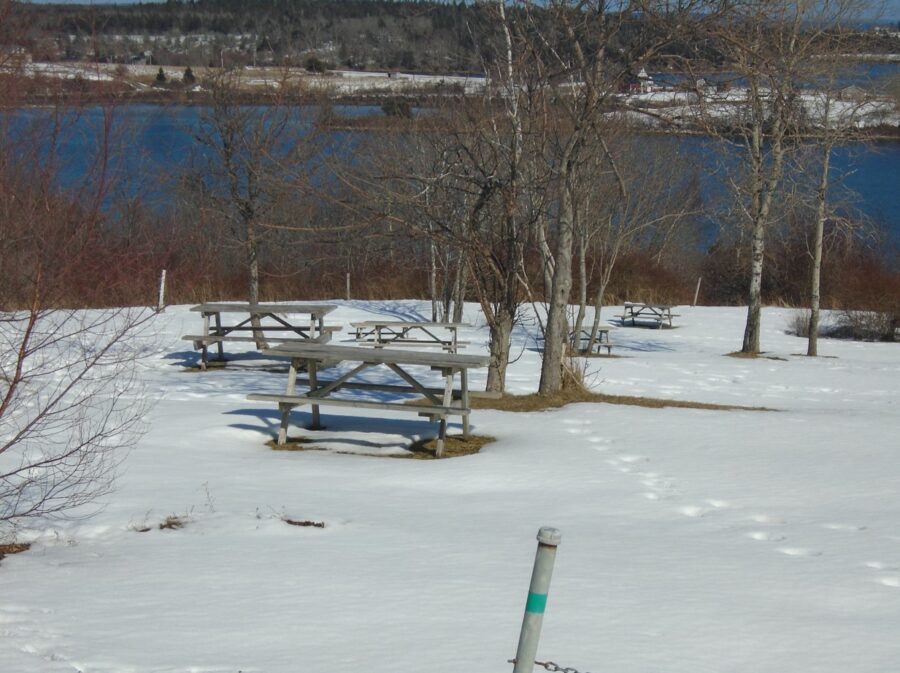
Back Harbour Lunenburg view from Blockhouse Hill Park. Lunenburg mayor Matt Risser and his town council propose a massive housing development at this 22-acre park, which was created by an Act of the NS government way back 265 years ago in 1758. (The Notebook).
The net result is that the town took over control of the town park, and the Lohnes Croft’s bill removed the “common interest” Lunenburgers had over the park – governed by the Lunenburg Common Act.
As The Macdonald Notebook has been reporting the UNESCO World Heritage Town of Lunenburg, with a population of 2,300, is currently attempting to attract housing developers to develop the town park at Blockhouse Hill – part of 1758 established Lunenburg Common Land.
The Lunenburg Town Council’s potential land sale via a request-for-proposal of 22 acres at Blockhouse Hill Park was announced in February by Lunenburg Mayor Matt Risser. He has been in office as Mayor since the pandemic in his first term.
Lunenburgers have not been specifically canvassed for their personal opinions on the potential sale of land, which the NS Government on Feb. 7th, 1758 placed in a “common trust” for the town inhabitants and many have been taken by surprise with the recent RFP released. The Town is relying on meetings where I am told that attendance by Town residents was slim but I wanted to confirm that information in person with the Mayor.
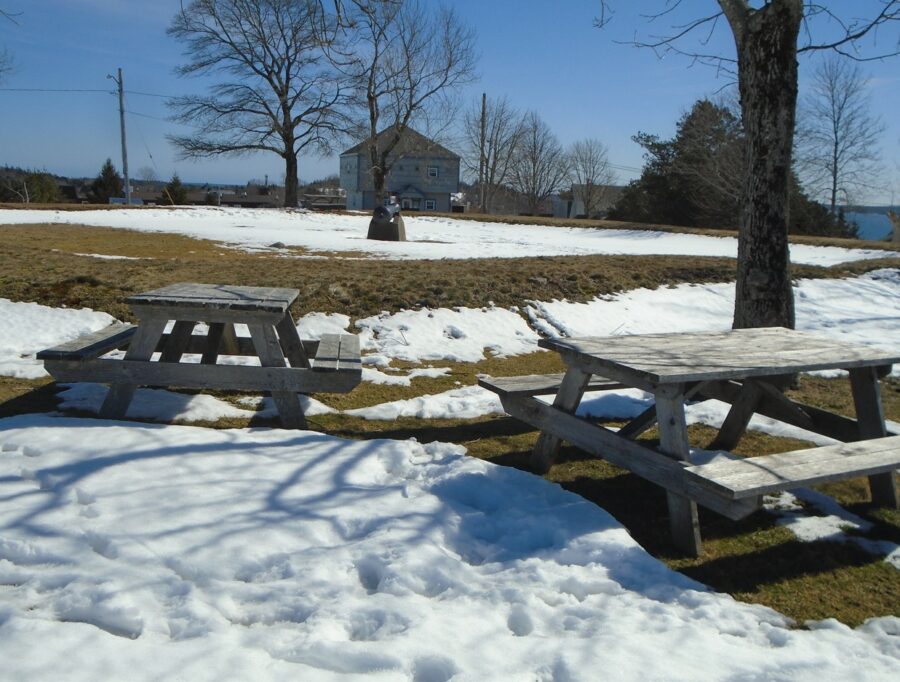
Blockhouse Hill Park has tons of picnic tables at the park, now under siege from property developers. (The Notebook).
The park has remained in the trust of the townspeople now for a very long 265 years.
The park on a hill overlooking both Lunenburg Back Harbour and Lunenburg Front Harbour had been in “a common trust” for the inhabitants of the town. The land is where the town campground is and the information tourist center. It has, over the years, served as a focal point for the celebration of the anniversary founding of the Town in re-enactments, holds a roster with the names of founding families that arrived in the 1700s to occupy the homes and lands included in the original design of the Town, is well-used by both local residents and tourists alike including as a site for the world-famous Lunenburg Folk Harbour Festival, and as recently as 2022 served as a base for the film crew filming Washington Black. In previous years it has also been the base for films shot on location in the Town. An industry that has benefited the Town directly.
Importantly, it is land that visually tells the tale of one of the bloodiest privateer raids in Nova Scotia termed the “Sack of Lunenburg“. See that Macdonald Notebook story here.
Having visited Blockhouse Hill park on Monday, I spotted many picnic tables in the park.
Days before the NS Legislature closed its session in 2017, then-two-term Liberal government MLA Suzanne Lohnes Croft sponsored a bill that received Royal Assent on Oct. 26th, 2017. The bill was discussed by town solicitor Pat Burke and Gordon Hebb, Chief Legislative Counsel (see partial letter from Pat Burke to Gordon Hebb below), with research documents from 2013. This information was provided to me by Best in our communications last week.

In Oct 2017, then Lunenburg Liberal MLA, Suzanne Lohnes-Croft was successful in passing a bill into law removing 1758 Crown land grants in Lunenburg from common lands. It meant townspeople do not have to be consulted when original Crown land grants are being sold by Lunenburg Town Hall. This bill allows the circa 20-acre Block House Hill tract to go to market at the behest solely of Lunenburg Town Hall. (Contributed).
Just freshly appointed into office on June 28, 2017, on Oct. 26th, 2017, NS Lieutenant Governor Art LeBlanc proclaimed the Lohnes-Croft Private Members Bill as law.
Oct. 26th, 2017 was a Thursday, the temperature reached 20 degrees with passing clouds in Halifax.
The net effect of Bill 36 was to take lands placed in “common trust” for the inhabitants of Lunenburg and give Lunenburg Town Hall complete authority over the lands.
No longer would there be a need to consult townspeople on land the 1758 legislature granted to them to use for common community purposes (i.e., building schools, parks, playgrounds, hospitals, etc.) to enhance the Town.
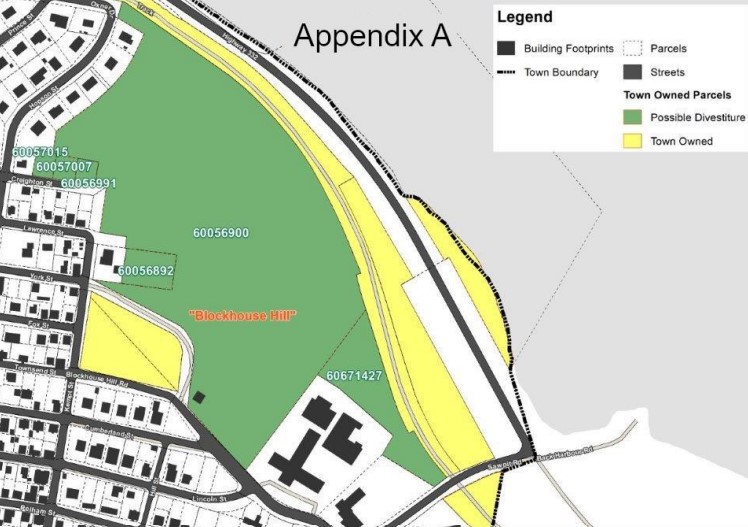
For 265 years – since the NS legislature in 1758 put circa 20 acres of Blockhouse Hill lands in common interest, this land has sat vacant. A bill passed in 2017 gives Lunenburg Town Council complete control over the land, and now Lunenburg Town Hall is attempting to sell the tract to property developers with an RFP.
Prior to the bill passing into law, certain lands in Lunenburg could only involve five-year leases, including the Blockhouse Hill land grant.
Lohnes Croft entitled her bill Lunenburg Common Lands (2017) Act – Bill 36. It was one of two bills she was responsible for bringing forward as Lunenburg MLA from 2013 to 2021.
The first reading of the bill was presented on Oct. 10th, 2017. Lohnes-Croft was not in the legislature that day, so then Chester-St. Margaret’s Grit MLA, Hugh MacKay introduced the bill into the House of Assembly.
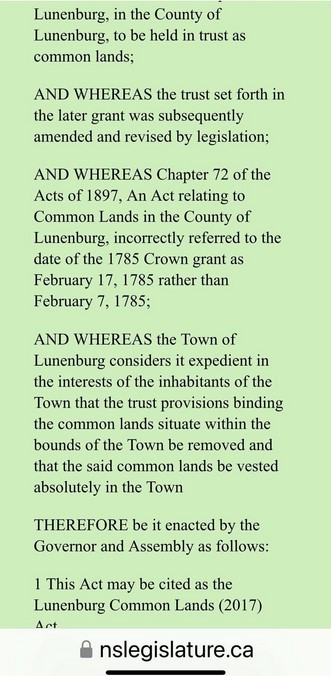
Lunenburg Town Council conducted an in-camera or secret meeting in 2013, behind closed doors and only put it into a public town council minutes on May 9th, 2017, successfully lobbying ex-Grit MLA and the McNeil government to pass a bill removing certain 1758 land grants from a common interest. The Town of Lunenburg has listed a Crown grant of 22 acres and because this bill passed, there is no requirement to canvass townspeople on the future of the lands, including 22 acres at Blockhouse Hill Park, where the town plans a large housing development.
Second reading of the bill occurred in the House of Assembly on Oct. 17th, 2017. The House session closed on Oct. 26th, 2017, when Lt-Gov LeBlanc enacted it into law.
The Act Relating to Common Lands in the Town of Lunenburg in 2017 was designed to change a piece of legislation passed in 1760 by the NS government, which at the time ” stated that the Governor had granted and set apart a tract of land lying in the peninsula of Lunenburg to serve as a common for the inhabitants of the Town of Lunenburg and required the Grand Jury to make regulations for the common at the March Sessions to be approved by the Justices of the Court of Sessions”, the Lohnes-Croft bill stated.
“AND WHEREAS a Crown grant was made on February 7, 1785, conveying certain lands in the Township of Lunenburg, in the County of Lunenburg, to be held in trust as common lands”. The date was changed to Feb. 17th, 1785 by an amended act in 1897.
In her bill, Lohnes-Croft explained: “the Town of Lunenburg considers it expedient in the interests of the inhabitants of the Town that the trust provisions binding the common lands situate within the bounds of the Town be removed and that the said common lands be vested absolutely in the Town.”
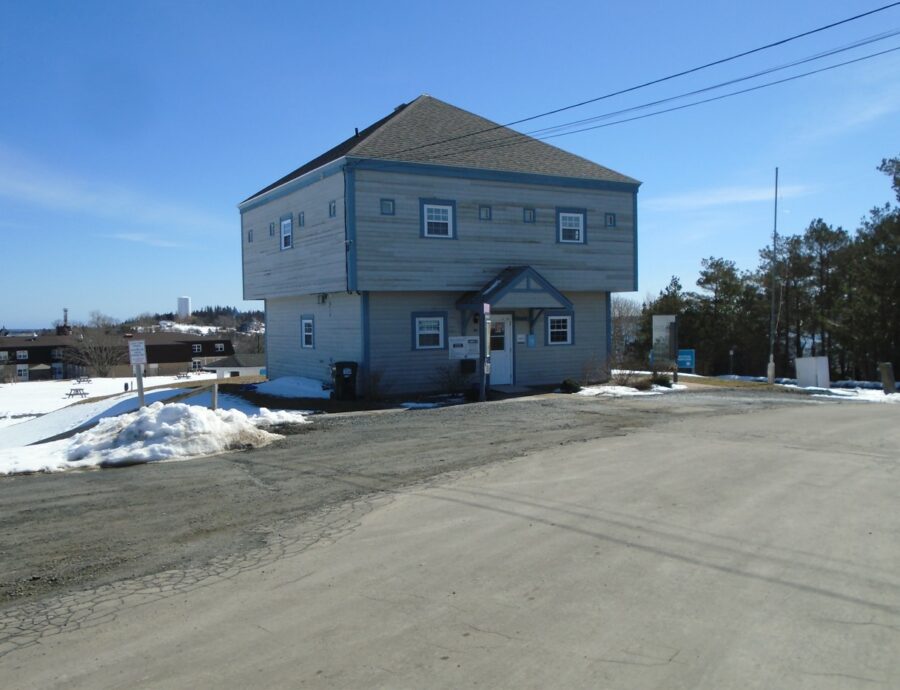
A replica 1750s military Blockhouse. Because Blockhouse Hill is positioned on a sloping hill overlooking both Lunenburg Back Harbour and Lunenburg Front Harbour, a British military encampment was based in the 1750s at the Lunenburg Common Land. Lunenburg town council wants to “divest” the park to a housing developer and has issued a tender for house designs at the people’s park, created by an Act of the NS government way back in 1758. (The Notebook)
The only MLA to speak at the bill’s second reading was Lohnes-Croft.
“This bill is well researched, it has been looked at by the town’s solicitor and for some time now it has been with Municipal Affairs and also the Legislative Counsel. This bill originally dates back to 1785 with King George II, when dividing up Crown land,” she said.
“It’s very forward-thinking, too, for the town and there seems to be confusion over common lands and lands owned by the Town of Lunenburg. The sole purpose, really, of this bill is to provide legislation that would vest in the town all remaining common lands owned by the Town of Lunenburg within the boundaries of the town, and free it from all trusts contained in grants and legislation,” explained the then Lunenburg MLA.
“Currently, from previous amendments, the town can only give five-year leases out to organizations. I’ll give you an example. A group came to the Town of Lunenburg requesting town lands for use as a dog park and the town was only allowed to give a five-year lease. A lot of volunteer hours and time-in-kind work was invested in this park by many businesses, and the town was only allowed to give them a five-year lease.”
What is missing from the discussion was whether there was any Town resident consultation or meaningful notice before being introduced on the floor. Nor is there specific mention of the town selling the lands.
While Lohnes-Croft suggested her bill would remove the need for five-year leases, and uses a dog park as an example of why the common lands are being given complete authority to Lunenburg Town Hall, it is that very bill that now allows Mayor Matt Risser and his town council to market the idyllic, tranquil and peaceful park to housing developers via a tender call for housing designs.
“This would allow the Lunenburg Town Council to be trustees” of the common lands, said Lohnes-Croft. But her example of a dog park did not indicate at the time the lands in question could ever be sold – and that is what is now happening to those common lands that for 265 years were considered a common land interest for the townspeople.
The debate closed with only Lohnes Croft speaking on the bill.
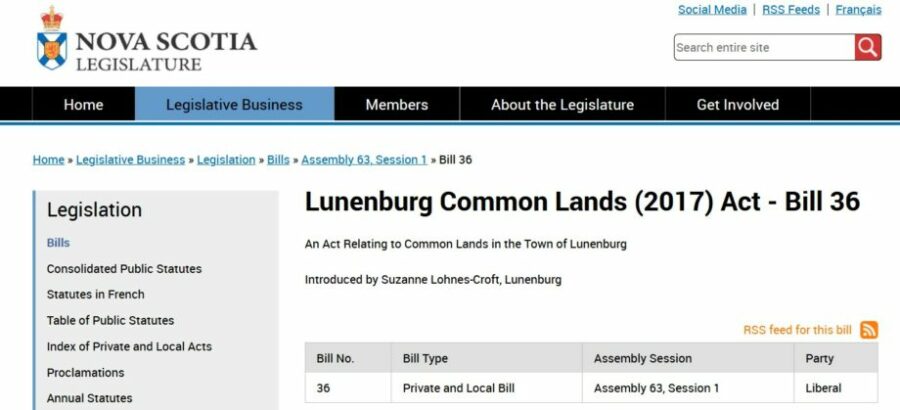
In 2017, then Liberal MLA for Lunenburg, Suzanne Lohnes-Croft successfully pushed Bill 36, Lunenburg Common Lands, into law, removing 1758 original Crown land grants from common interest, meaning town residents have no say over what happens with the land – which Lunenburg Town Hall is now attempting to potentially sell a 22-acre tract to developers at Blockhouse Hill Park.
“A Request for Proposals (RFP) was issued to obtain development concept proposals for the lands on Blockhouse Hill. The Town is looking to divest ownership of the lands into private hands for a mixed-use residential development with a balance of affordable and accessible units,” the town stated.
Now on the reason why I termed the Lohnes-Croft and Lunenburg Town Hall deal surrounding the Lunenburg Common Lands Park a secret deal.
It had been a secret deal at Lunenburg Town Hall between 2013-2017, according to town documents I have viewed.
In 2013, the town council met in an in-camera session – behind closed doors – to hear a report from town solicitor, Pat Burke on how the town hall wanted to take over control of the people’s park.
A letter dated August 6th, 2013 written by town solicitor Pat Burke and sent to then town chief administrative officer Bea Renton spelled out that the town would proceed to have the 1758 Lunenburg Common Lands Act re-written to give the town hall total control over the town park.
Incredibly, even though Blockhouse Hill Park was created by an act of the 1758 NS government, lawyer Burke states in 2013 he only became aware “that certain lands in the Town of Lunenburg are common lands.”
In the August 6th, 2013 letter, lawyer Burke wrote to the town hall: “It is, therefore, my recommendation that the town consider having a Private Members Bill passed by the Legislature of the Province of Nova Scotia to ensure that the Town holds the common lands within the Town of Lunenburg in the same manner as any other Town lands without restrictions on the use or alienation thereof.”
The town council accepted the letter in an in-camera session, a behind-closed-door meeting, or a secret meeting.
That was in 2013.
Now, Lunenburg Town Council did not post Burke’s recommendation to re-write the Common Lands Act on town council minutes until four years later.
The 2013 recommendation from Burke to re-write a 1758 law governing the town park did not get posted to the town’s public council agenda until four years later – on Tuesday, May 9th, 2017.
So for four years, the town’s desire to re-write the law governing the town park remained a secret – for four whole years.
Only in May 2017 did Burke’s August 2013 recommendation hit the agenda for town council. The item on the town agenda for May 9th2017 noted: “Draft Common Lands legislation – Town Solicitor report/motion to proceed with Provincial legislature approval.”
But Burke’s report was from 2013. It remained a secret land deal until 2017.
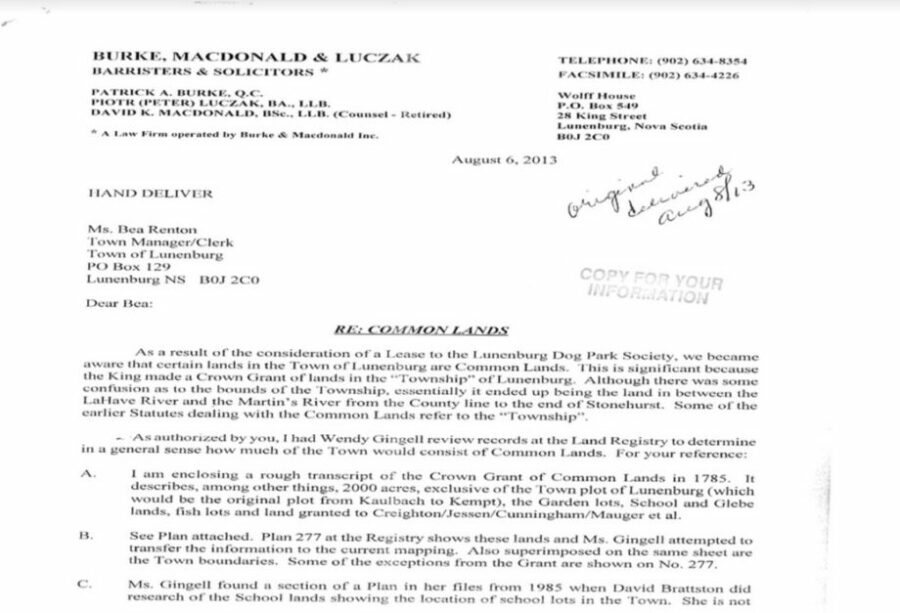
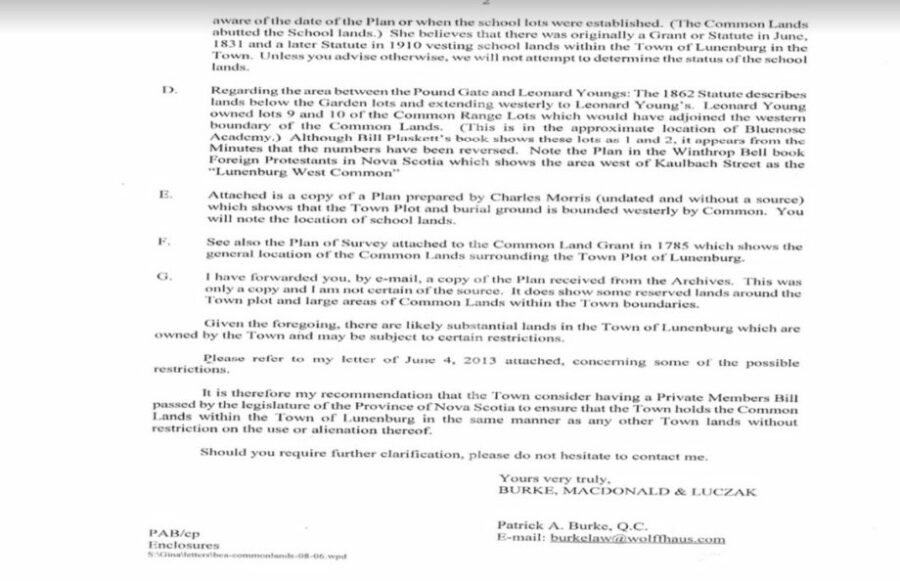
The August 6th, 2013 letter discussed in-camera was released last week by the town, when I asked for documents. To download the PDF file of lawyer Burke’s letter click here (PDF).
A letter town lawyer, Burke, sent to the NS Legislature’s Gordon Hebb, then the Chief Legislative Counsel (who drafts bills) dated Nov. 20th, 2013 on the town’s desire to re-write the Lunenburg Common Land Act, was not made public by Town Hall until May 9th, 2017. That letter in part stated:
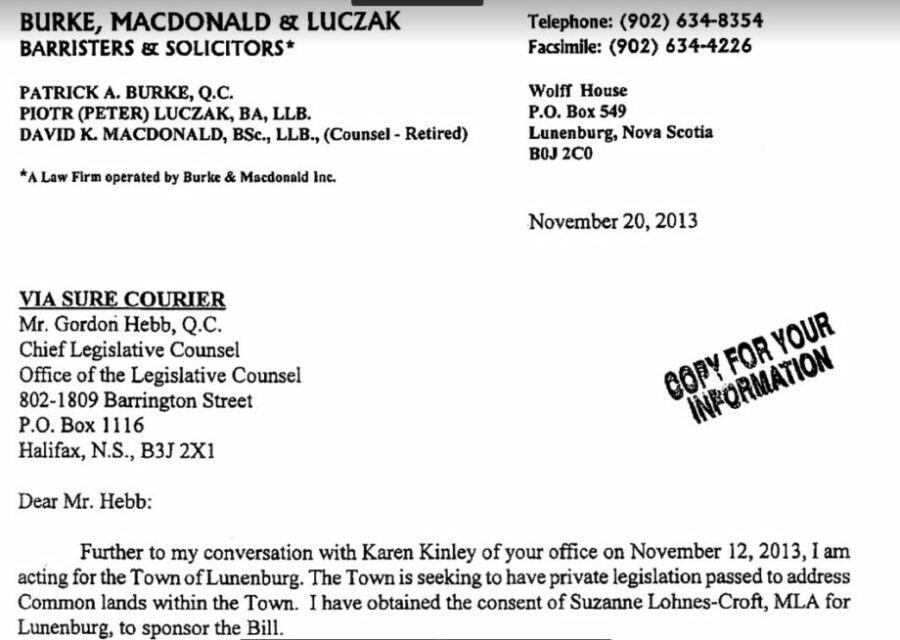
For the full Nov. 20th, 2013 Pat Burke letter sent on behalf of Lunenburg Town Hall to the NS legislature, readers can download the letter, click here (PDF).
Last week, Lunenburg Town Hall PR officer, Michael Best demanded a correction when I termed it a ‘secret land deal’.
I am not backing down – the idea of Lunenburg Town Hall taking over the control of Lunenburg Common Lands, and thus Blockhouse Hill Park – remained top secret for four years.
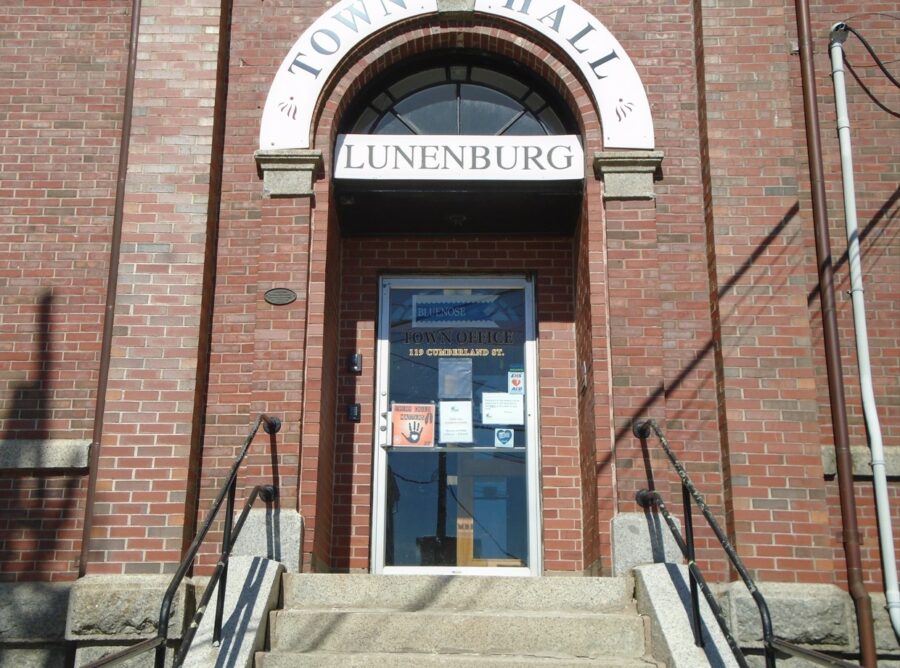
Lunenburg Town Hall press agent, Michael Best, demanded a correction when I wrote the desire of town council to re-write a 1758 law governing the Lunenburg Common land was a secret deal. The Notebook won’t back down, the land deal was secret from 2013-2017. (The Notebook).
Mr. Best wrote last Thursday to The Macdonald Notebook seeking a correction on the use of a ‘secret deal’.
In part here is his letter:
“Your article mentions a “secret deal”. It’s not a deal and it was never secret. I would like to request a correction.
At the May 9, 2017 public Council meeting there was a full report from the Town Solicitor with respect to amending the Common Lands Act. Please see attached.
At the Nov. 28, 2017 public Council meeting there was another report from the Town Solicitor, confirming the Act had been amended. Please see attached.
Both the attached documents are public agenda packages that would have been posted to the Town website prior to each meeting. This information has been public for well over five years.
You also make reference to an in-camera session as being “secret and “behind closed doors” That’s also not entirely accurate.
For in-camera items, the Municipal Government Act (MGA), the provincial act that regulates municipal matters, allows for Council to discuss certain items in closed session. Closed session (or in camera) means that the public cannot observe these meetings.
Items permitted to be discussed in closed session (in camera) are:
- personnel matters;
- labour relations and contract negotiations;
- plans to buy, sell or lease property;
- legal advice; and (which would have been the case regarding this issue)
security issues.
Following an in-camera discussion, if Council has any decisions to make, they will do so in public session, which means that those decisions are recorded in the public minutes. At Town of Lunenburg Council meetings, this reporting of in-camera discussions and any decision making happens near the end of the meeting under the agenda item called “Resumption of Council meeting in Public Session” or sometimes you’ll see or hear it called “Rise and Report”.
There are provisions in the MGA that allow us to release reports or other in camera documents after 10 years or if five or more years have passed since a decision was made. A decision was made on this issue and five years have passed, so we can release the record of the in-camera document presented in 2013 regarding this issue. See attached.
All public agendas and minutes are always available to the public, but we don’t keep everything on the website so as not to bog it down with years and years of documents, so we have this note on the Council meetings page: If you’d like access to meeting records beyond what is posted, please contact the Municipal Clerk…”, wrote Best.
As The Macdonald Notebook reported between 2013-2017, it was top secret at town hall that it wanted to take over control of the Lunenburg Common Lands, eliminating any “common interest” held by the townspeople. The Notebook won’t be issuing a correction to Mr. Best. It was a secret for four years of the town council’s desire to take over the Lunenburg Common Lands, which also include Blockhouse Hill Park.
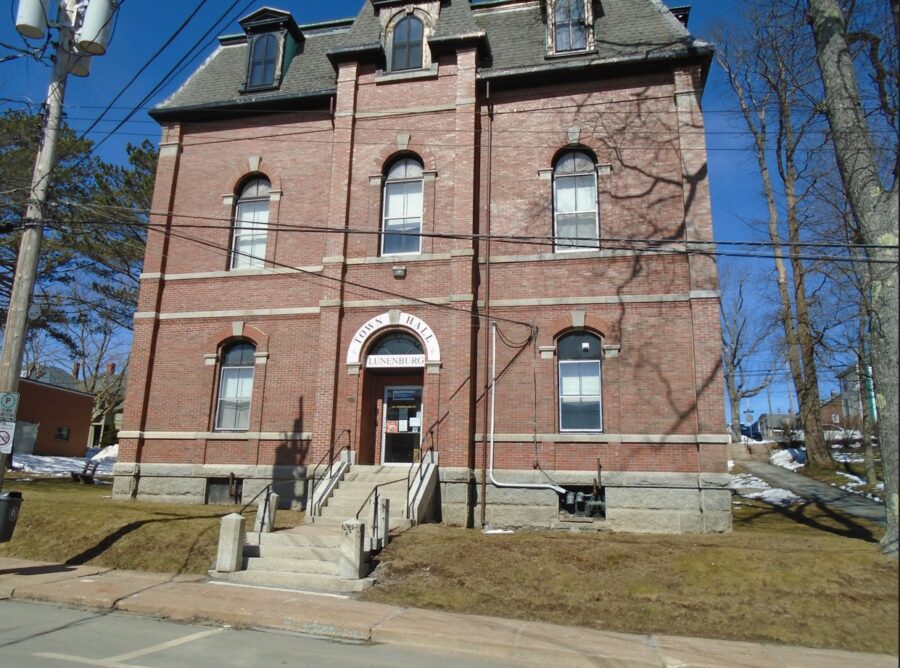
Lunenburg Town Hall. Mayor Matt Risser and his town council issued a tender call aimed at property developers to provide housing designs for a town park, which Town Hall states it could “divest” to a property developer. (The Notebook).
For more The Macdonald Notebook news coverage on Blockhouse Hill Park and the Lunenburg Common Lands, here are 11 more news articles in The Notebook – these articles are behind a paywall and in order to read them you need to take out a subscription, click here for more articles.







